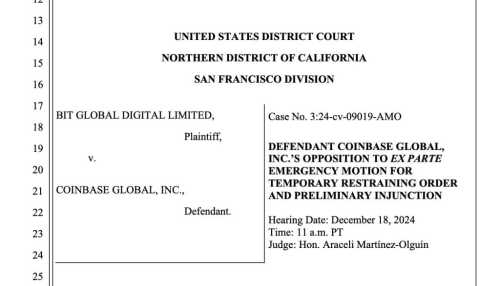Coinbase Dismisses Justin Sun-Linked BiT Global Lawsuit Over wBTC Delisting

Coinbase, the prominent cryptocurrency exchange, has successfully fended off an attempt by Hong Kong-based BiT Global Digital Limited (BiT) to block the delisting of Wrapped Bitcoin (wBTC) from its platform.
BiT Global lost. Today they asked the Court to order us to stop from delisting wBTC to protect our customers. Today the Court said no. We appreciate the Court’s consideration and the outstanding advocacy of Sonal Mehta and her team at @WilmerHale.
— paulgrewal.eth (@iampaulgrewal) December 18, 2024
BiT, a firm allegedly linked to crypto entrepreneur and Tron founder Justin Sun, sought emergency legal relief to prevent the delisting.
It claimed that it would cause irreparable harm to its business and the broader crypto ecosystem.
However, the U.S. District Court ruled against BiT, siding with Coinbase’s argument that the delisting was a necessary step to protect its customers and uphold the integrity of its platform.
At the heart of the dispute was Coinbase’s assertion that Justin Sun’s involvement with BiT and its joint venture with BitGo raised significant concerns for them about the custodianship and reliability of wBTC.
Coinbase cited Sun’s controversial reputation, marked by allegations of fraud, market manipulation, and ongoing investigations by U.S. authorities, as a critical factor influencing their decision.
Coinbase’s Vs. Bit Global: Are Justin Sun’s Allegations True?
Coinbase’s filing against BiT’s motion for a temporary restraining order and preliminary injunction detailed its rationale for delisting wBTC.

Source: CTFAssets
The exchange emphasized that its decision was based on its robust internal review process, which evaluates digital assets for legal compliance, technical soundness, security, and overall risk.
According to Coinbase, the review that led to wBTC’s delisting was initiated after BitGo announced a joint venture with BiT and Justin Sun.
Sun’s involvement, a figure associated with multiple allegations of financial misconduct, including fraud and market manipulation, raised red flags for them about the custodianship of wBTC.
Coinbase further argued that BiT’s evasiveness regarding the joint venture’s ownership structure and Sun’s role exacerbated concerns.
The exchange stressed that, as a private company, it retains the right to determine which assets it lists or delists, particularly when the imperative to protect users from undue risks drives such decisions.
Coinbase also highlighted its history of delisting assets that fail to meet its rigorous standards, pointing out that wBTC accounted for less than 1% of its trading volume, with most transactions involving the asset occurring on other platforms.
This, they argued, minimized any potential harm to the public caused by the delisting.
The court’s ruling affirmed Coinbase’s stance, noting that BiT had delayed seeking emergency relief, which undermined its claims of urgency.
Moreover, the court dismissed BiT’s assertions of irreparable harm, pointing out that monetary losses could be addressed through damages if warranted.
The decision also rebuffed BiT’s allegations under California’s Unfair Competition Law (UCL), affirming Coinbase’s right to protect its platform from assets linked to questionable actors.
Justin Sun’s Reputation As A Focal Point
Justin Sun’s involvement was an underlying factor in the case. Coinbase’s filing elaborated on Sun’s controversial history and ongoing legal troubles, which recently gained more attention with the CoinDesk scandal.
The exchange argued that BiT’s association with Sun, rather than its decision to delist wBTC, was the primary driver of any reputational harm the firm might have suffered.
This framing resonated with the court, which found that BiT’s injuries were largely self-inflicted.
However, critics of Coinbase’s decision have pointed to the absence of proof of reserves for its own tokenized Bitcoin product, cbBTC, as a potential weakness in the exchange’s arguments.
While wBTC has traditionally been viewed as a trusted wrapped asset with 1:1 Bitcoin backing, the rise of cbBTC which has rapidly gained market share since its launch.
Some industry observers have suggested that Coinbase’s move could be motivated by competitive interests rather than purely risk-based concerns.
Source: cryptonews.com



